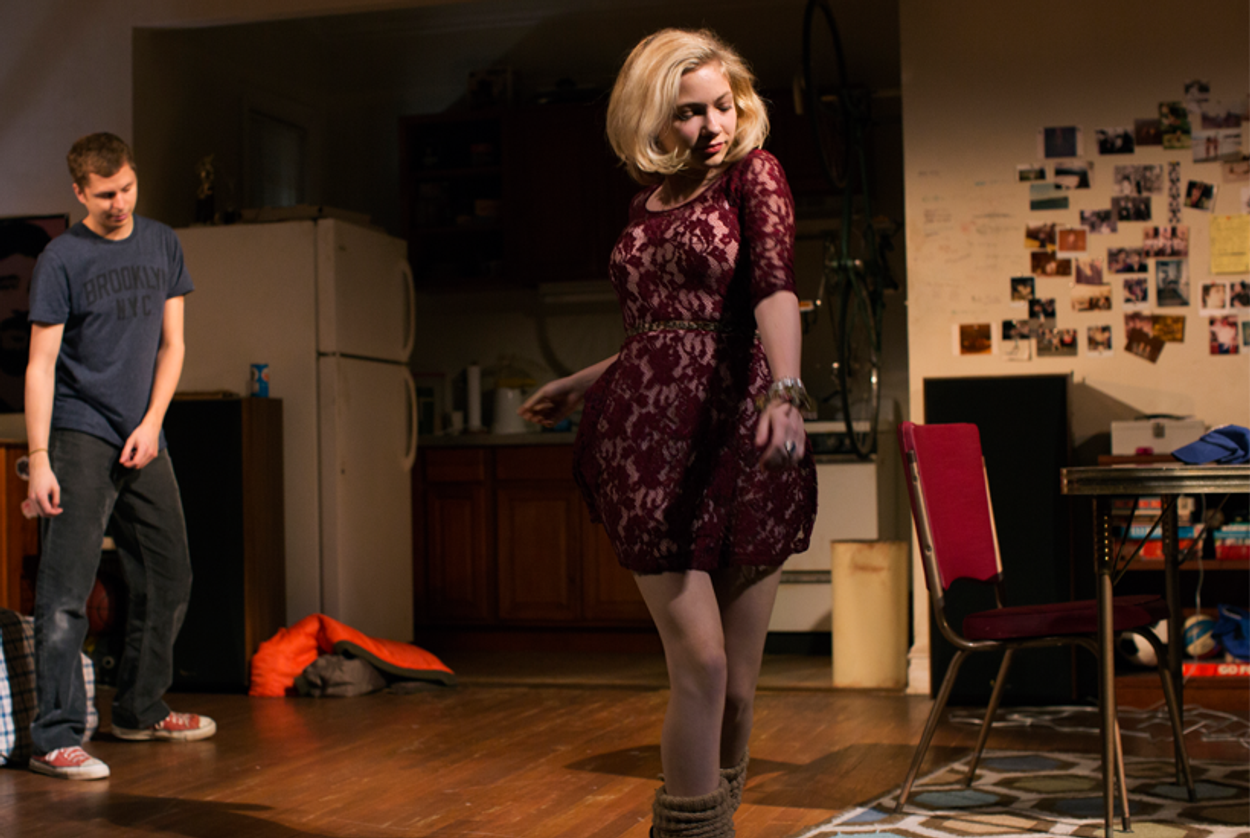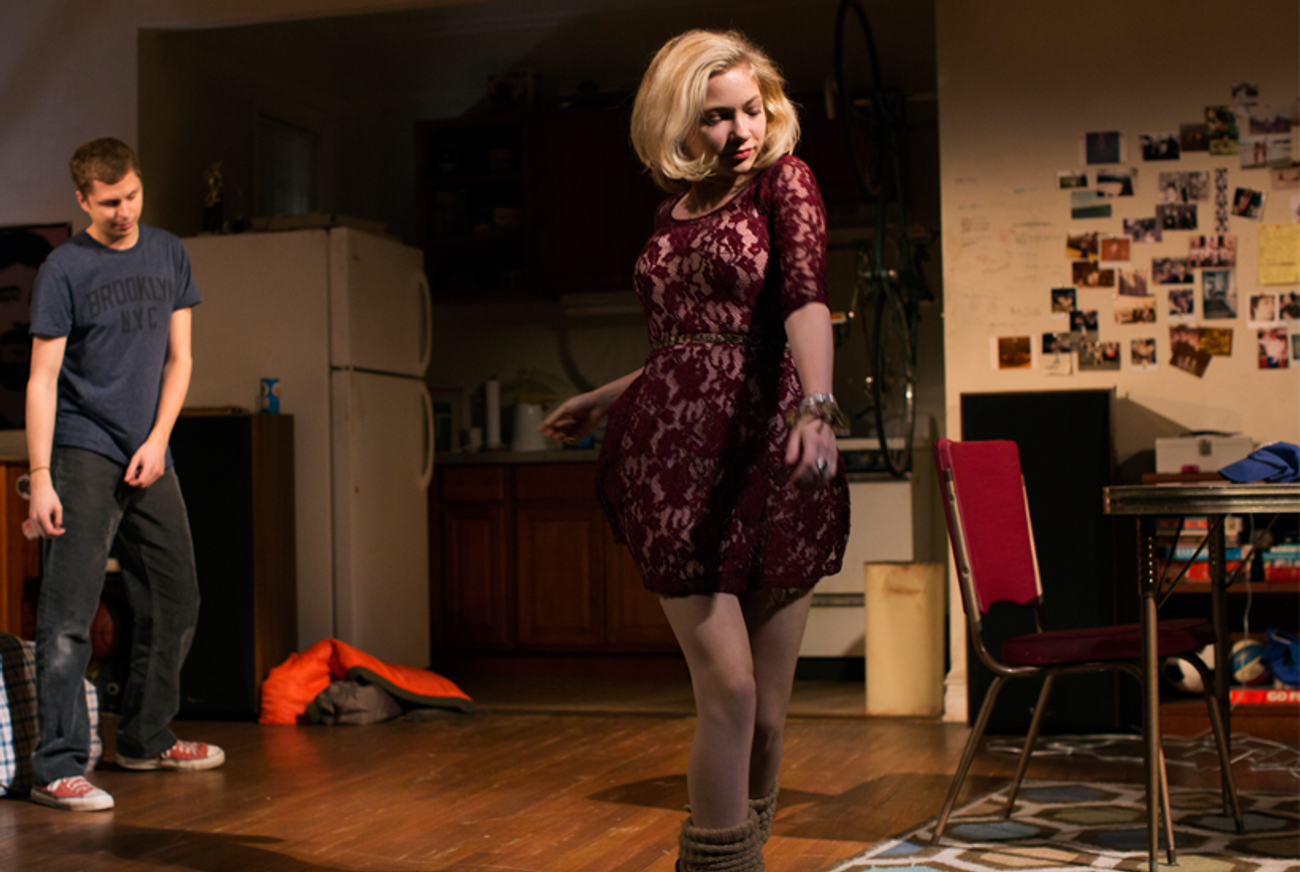Kenneth Lonergan Is the Greatest Jewish Playwright You Didn’t Know Was Jewish
‘This Is Our Youth,’ with Tavi Gevinson and Michael Cera, portrays the ‘pathetic remnants of Upper West Side Jewish liberalism’




There’s a jarring moment early in This Is Our Youth, Kenneth Lonergan’s 1996 play currently nearing the end of its run at Broadway’s Cort Theater. Dennis, a part-time drug dealer and full-time slacker in his early twenties, has crafted an elaborate plan to buy and sell cocaine using $15,000 in cash that his friend Warren has stolen from his own father. Warren, a few years younger, takes issue with Dennis’ allocation of the projected profits. Dennis scolds him. “Don’t ever try to out-Jew me, little man. I’m twice the Jew you’ll ever be. I’m like a Jewish god. I’m like, Jooooolius Caesar,” he crows. Dennis is played by Kieran Culkin; Warren by Michael Cera. Both famous film actors, both decidedly gentile.
Audience members who, like myself, had not given their Playbills a glance should be forgiven for their puzzlement. But had they done so, they would have discovered that the year is 1982, the place is the Upper West Side, Dennis is Dennis Ziegler and Warren is Warren Straub (they are joined by Jessica Goldman, played by Tavi Gevinson, the writer and teen-magazine impresario, who is Jewish). And Kenneth Lonergan might just be one of the most important American Jews writing for stage and screen today that very few realize is Jewish.
Lonergan told me that such reactions aren’t new. “I’ve read this several times, it amazes me actually,” he told me later. “Some magazine with a derivation of the word Jewish in the title, writes ‘all this from a playwright named Lonergan.’ Don’t they know it goes down through your mother?” The playwright was born in 1962 to an Irish father and a Jewish mother who divorced when he was very young. His mother’s grandparents were from Russia and Austria. His great-grandfather started out selling books out of a wheelbarrow on the Lower East Side and ended up with a successful publishing company.
Growing up half-Jewish and half-Irish, scion to the two great oral traditions, surely has its benefits for a playwright. (Lonergan also likes to riff on the differences between Jewish guilt and Catholic shame.) Had he kept his mother’s maiden name, Milch, he might have been more widely regarded as a Jewish writer. Still, it infuses his work. “As everybody knows, you write best about themes you know something about, and when you can draw the particulars from your life, you don’t have to make as much up,” he said. “I tend to be very literal about this. In [the 2011 film] Margaret, the main character was half-Jewish. In The Waverley Gallery, there’s a character with a Jewish mother and an Irish father. This Is Our Youth wouldn’t really be right if they weren’t Jewish. So, I don’t think I’m any more or less Jewish in my writing than I am in my life.”
Lonergan attended Walden, the private progressive day school, now defunct, on 88th Street and Central Park West, a couple of blocks away from his home. “I was about 7 or 8 years old before I stopped assuming that everyone I met was Jewish,” he said. “I don’t know how seriously we’d be taken as Jews, but we certainly considered ourselves Jewish by virtue of cultural tradition, and it made us feel smart.” In his autobiographical memory play The Waverley Gallery, about his grandmother, the family members are described as “atheist, Jewish, Upper West Side intellectuals who like German choral music,” a demographic that recalls his own upbringing. “There were a lot of doctors and lawyers, some social workers and people in show business,” he said. These are the parents of the Youth gang. In the play, Jessica calls them “the last pathetic remnants of Upper West Side Jewish liberalism.”
Lonergan told me that he was brought up with a very keen awareness of the Holocaust and with plenty of exposure to anti-Israel sentiments. “I remember hearing the same comments over Thanksgiving, endlessly. Broadly speaking, most New York Jewish intellectuals tend to be anti-Israel, and I disagree with a lot of my friends on this,” he said. “Someone asked me recently if I was pro-Israel. I said, ‘Well I’m not pro-Hamas!’ The standard comment is, yes we know they’re terrible, the Islamic extremists and anti-Israel factions in the Middle East, but—and then they go on about how horrible Israel is.” He said he felt that this common posture was a sort of liberal racism, “where you have an overly benevolent and understanding position toward non-white cultures that behave just as appallingly as white cultures that you are very quick to jump on and condemn. That’s a very common feature of the atmosphere I grew up in. It accounts for quite a lot of the strange bias that you hear in left-wing circles and it fits the pattern just as well as the clearly racist xenophobia that you hear in right wing circles.”
Jewishness is a defining and fruitful part of Lonergan’s personal and artistic identity in part because he appears to feel very little ambivalence about the fact that it might define him. “There’s no religious feeling, but I still feel that it’s part of my identity and background, the same as being a New Yorker is, the same as being partly Irish is, the same as being an American is,” he said. “It’s hard to define and I think it’s undesirable to reject and hard to ignore. But like anything else it’s very dependent on the exact particulars of your circumstances and the more you generalize about it the less true it becomes—and the less specific you are the more truthful and useful it becomes. So, I don’t think it’s wrong to call me an American writer, or an Irish-American writer or a Jewish-American writer or a New York writer, but I don’t think it’s necessary either. I think it’s there, so there it is.”
***
Lonergan’s success makes one retrospectively optimistic for his young characters. The play captures the kids at a particularly fraught moment. They are lucky and smart and very much in a funk: not quite smart enough to truly realize how lucky they are. “Do you know how bad you guys would have to fuck up before anything really serious ever happened to you,” Warren quotes his father asking him—and the two young men seem determined to try and find out just how bad things can get. For Lonergan, the 1980s meant the twinned bummers of high-school graduation and Ronald Reagan. “There was something discouraging about the general background of the world at the time. Just as you step out into the world you have Reagan being elected president—something that was first regarded as a joke and then a major catastrophe when it actually happened,” he said. “And suddenly you realize what a small minority you’re in.”
Warren lands in Dennis’ apartment with a suitcase packed with his most prized possessions—mostly antique toys and LPs he plans on bartering. His most beloved piece of memorabilia, though, is a baseball cap from opening day at Wrigley Field, in 1914, that used to belong to his mom’s father. He tells Jessica that his grandfather “was actually really cool. … When he would meet one of my friends, I’d be like, ‘Grandpa, this is my friend Neil.’ And my Grandpa’d be like, ‘Nice to meet you, Neil. Are you Jewish?’ And my friend Neil would be like, ‘Um … Yeah?’ And my Grampa’d be like, ‘Neil, in the year 1923 I was the greatest Jewish aviator in this country. That’s because I was the only Jewish aviator in this country. You wanna see a picture?’ ”
Tavi Gevinson, barely 18-and-a-half, is responsible for Youth’s most surprising performance. Though her character Jessica’s romance with Warren is short-lived, her generosity seems just enough to help him out of his downward spiral. Gevinson looks like she might often have that effect on people. This is her third or fourth new career, depending on how you count: Beginning six years ago with a fashion blog, Style Rookie, which begat an online teen magazine called Rookie Magazine, which begat a line of best-selling yearbooks (all three quickly became veritable empires in their own right). Somewhere along the way a film career was launched, and now one on stage. Gevinson started our interview by saying that she was the only Jew in the play, but then corrected herself. “Well, actually I was told that I’m not really Jewish, because technically my mom converted after I was born,” she said. “I was told that she had to be Jewish for it to count. I was like, ‘You can’t take this away from me, it’s my identity.’ And our costume designer was like, well it doesn’t count!”
Gevinson told me that her father, an English teacher, was raised Orthodox and became Reform as an adult. Her mother, who grew up in Oslo, now weaves tapestries with Jewish themes. “She converted to Judaism, but not for my dad, she just really identified with it,” Gevinson told me. “I went to Hebrew school twice a week and had a Bat Mitzvah. When I lived at home I’d do holidays with my family. It’s a huge part of how I grew up, but it’s more cultural for me. Even when I was little, I was never being threatened or told that something was a sin. At my synagogue it was more like, ‘be a good person, be nice to people, help people out.’ ”
Gevinson spoke with me over the phone as she was being driven to the theater on 48th Street for an evening performance. As she stepped into the theater, her co-star Kieran Culkin began teasing her and the rest of the interview was punctuated with giggles. She said that her own Judaism—whether recognized by rabbis and costume designers or not—gives her little insight into her character’s own emotions, but it does help her identify with the situations in the play. “Like when Warren is telling Jessica about his baseball cap and his grandpa,” she said. “And it’s like, I know this moment, it’s a nerdy Jewish boy giving me a story about his nerdy Jewish grandpa. I’ve been in this situation before. For me it’s been more cultural than religious, and that’s the way it’s been for the characters in the play, for sure. And so I relate to the world that they’ve grown up in.”
For all of Lonergan’s talk about coming of age in the early ’80s, Gevinson doesn’t feel as if she’s acting in a period piece. “There are land-lines or whatever, and Kenny did talk to us a little bit—‘you have to understand what it was like, our parents were hippies but then Reagan just bummed us all out’—but for the most part it feels so timeless to me,” she said. “I think because the way the characters speak is so colloquial and real. They might be ranting about Reagan, but the emotional themes are just so universal that they’re not tied to a specific moment in time. I mean, I relate to it completely.”
***
You can help support Tablet’s unique brand of Jewish journalism. Click here to donate today.
Tal Kra-Oz is a writer based in Tel Aviv.
Tal Kra-Oz is a writer based in Tel Aviv.